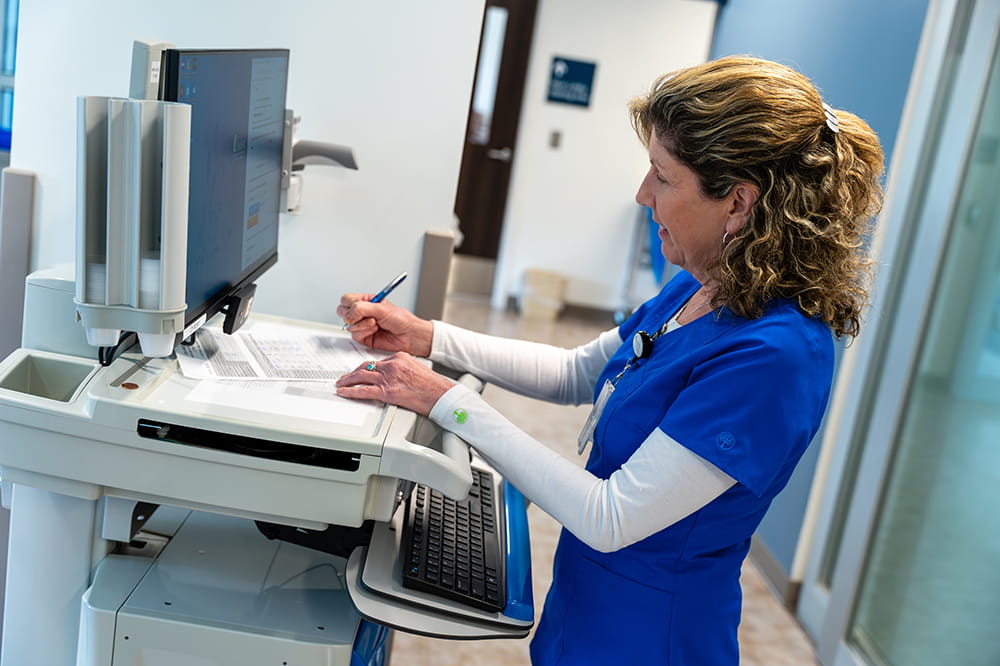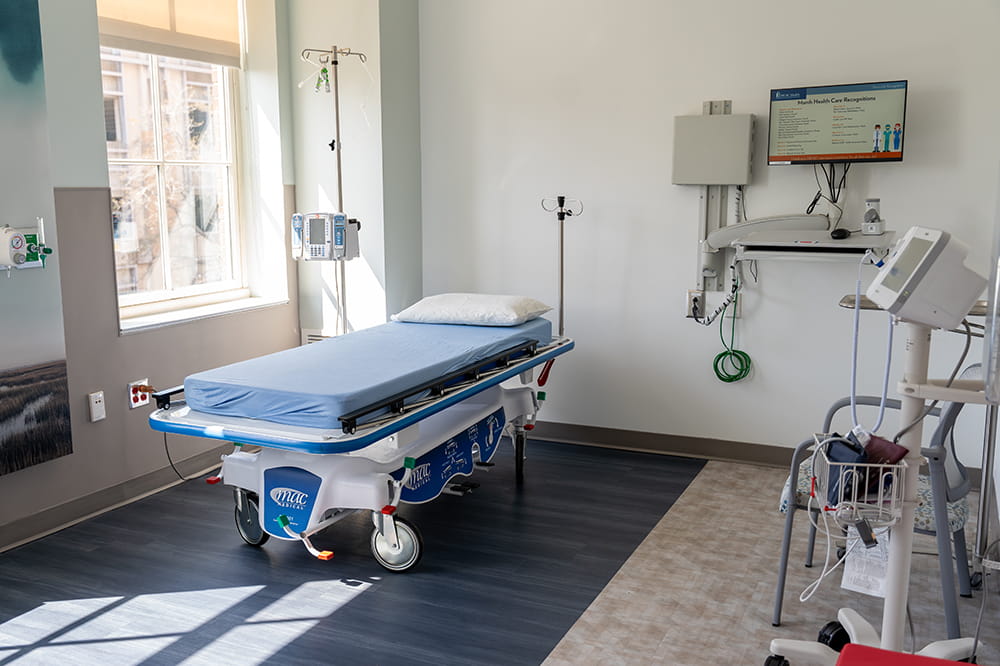After five years of planning and anticipation, MUSC Hollings Cancer Center has opened the Anderson Advanced Cancer Therapy Clinic to provide specialized care to patients participating in phase 1 clinical trials for cancer. This is Hollings' first dedicated clinical cancer research unit.
This new clinic space means Hollings will be able to offer patients more and different types of clinical trials that were logistically challenging under the previous arrangement.
Beyond that, it means that future patients will benefit from the specialized clinical expertise of Hollings nursing and physician teams. When the Food and Drug Administration (FDA) approves new treatments, they won't be new to Hollings team members because they'll most likely have already administered these new therapies in the years leading up to final FDA drug approval.
Hollings director Raymond N. DuBois, M.D., Ph.D., said this unit showcases Hollings' commitment to offering the most promising clinical trials.
"Clinical trials are how we improve cancer care for everyone, and quite often, clinical trials are a lifeline for the individual patients who choose to participate," he said.
"As an NCI-designated cancer center, conducting research and offering clinical trials is inherent in our mission to reduce the burden of cancer in South Carolina. Our team has worked diligently to develop this unit, and I am excited to see the outcomes this will enable. The Anderson Clinic allows us to develop the best possible treatments today for cancer patients we will see in the future. Without this kind of research, we would not be able to continually improve our outcomes."
Advancing cancer care
A quiet oasis of sunlight and calm, the clinic includes everything that could be needed for phase I trials, from spacious areas for infusion to a dedicated nursing team comprised of experienced infusion nurses with specialized training in chemotherapy and immunotherapy infusion and clinical trials' protocols.
"One of the biggest benefits is the way that we've been able to elevate the care that these patients are receiving," said Sierra Baker, R.N., the nurse manager of the new clinic on the third floor of the Hollings building. "Our phase I patients appreciate the one-on-one attention they get from the staff during what can be a very challenging time and the fact that they are attended to by the same clinicians every time they come in."

While the nursing staff worked intently to care for patients in clinical trials and standard-of-care patients simultaneously under the previous system, it was certainly more challenging to keep up with the intensive recordkeeping that clinical trials entail. There are many federal and local laws that govern how clinical research is performed to ensure that patient safety is always the highest priority.
When a patient volunteers for a clinical trial, there's additional safety monitoring as well as multiple layers of oversight, including the local study team at MUSC and the study sponsor, which could be a pharmaceutical company, device manufacturer, federal agency or another cancer center. The study sponsor continuously reviews safety and efficacy data as it comes in from all cancer centers that are offering the trial. In order to analyze clinical trial data correctly across many trial sites, each cancer center must perform the trial in the same way under strict guidelines and intensive training.
Good records produce good data, which means reproducible results and a better understanding of how the drug works, said Katherine Vosburgh, R.N., assistant director of clinical operations in the Hollings Clinical Trials Office.
"Being as consistent as possible makes the research that much better," she said.
Baker and Vosburgh are also pleased to see how their teams - one from the clinical side and the other from the research side - are jelling into a focused unit.
"It's really helped increase collaboration between the Clinical Trials Office and the clinical team that actually does the infusions and monitoring," Baker said.
How clinical trials affect care
Most clinical trials - for all types of diseases - go through three phases before FDA approval. Phase I cancer clinical trials, the primary focus of this center, primarily look at drug safety as well as side effects, best dosage and timing. Phase I trials may be the first time new drugs are used in humans, or they may be evaluating a specific combination of already approved drugs.
Because the drugs or drug combinations are new, they offer the possibility of receiving a therapy that could one day be considered standard.
John Kaczmar, M.D., a head and neck cancer oncologist, serves as the physician lead for the phase I unit. He's excited about what this unit means not only for his own patients but for all patients who will be able to try new therapies.

"The Anderson Clinic is a game changer in so many ways. First and foremost, we have attracted a highly trained research infusion nursing staff. Their expertise will help streamline patient care on these complex treatment protocols," he said. "Additionally, the clinic itself is a forward-thinking, functional and inviting space that will allow for dynamic patient care and improved patient comfort during therapy. The Anderson Clinic is a tremendous addition to the Hollings Cancer Center and our entire phase 1 team is excited about how our patients can benefit from it."
Tricia Adrales Bentz, administrative director of the Hollings Clinical Trials Office, sees this new unit as a benefit for all Hollings patients, even if they never participate in a clinical trial.
"Through the process of doing these research studies, our Hollings clinicians have gained expertise in the latest breakthroughs before anyone else," she explained. "When the next FDA cancer drug is approved, our specialized research team and clinical providers, who contributed to these clinical trials, will have already gained expertise in administering these latest drugs. Our providers will already be familiar with the safety profile of these novel drugs and know how to minimize reactions and maximize patient benefit. Overall, this new research unit takes our already great research facility to the next level."






